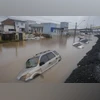Introduction to Storm Boris
Storm Boris has struck the heart of Central and East Europe and paved the way for the worst floods and destruction. Houses were flooded; whole villages in the eastern part of Romania; the consequences are not solely felt in the areas that have been more affected by this natural calamity. Surprisingly, as these communities continue to seek post-disaster solutions, the call for humanitarian assistance and proper disaster management could not be more urgent.
The Devastation in Romania
It could be said that in Romania the situation is even worse. Whole villages are flooded, and people are still stuck in their homes while firefighters continue their efforts to evacuate the victims from the villages. Some of these rescues involve acts of bravery, such as taking people on their backs, implying that the flooding was terrible. Animals, for example, livestock, have been severely affected, and it is almost heartbreaking to describe the losses. The people cry out in agony, evoking their pain and frustrations as they are forced to stay longer without any form of help that would help to address their problems.
Impact on Communities
It is possible to tell that the many communities that were affected by Storm Boris have really been made to suffer in terms of emotional point of view as well as losses. People describe their homes being destroyed with their livelihoods gone, claiming, ‘’Our animals are dying. Everything is dying’. This accounts for the need for help that needs to be offered in the next one hour, today or within the next few weeks by the locals and international organizations.
The Situation in the Czech Republic
At the same time, in the Czech Republic, over fifty thousand houses remained without electricity after the storm. As mentioned earlier, this has been referred to as the worst flooding since many decades, similar to the one that occurred in 1997. The flooding's impact is still felt today.
Efforts to Mitigate Damage
To curtail the effects on the remaining structures, local governments are trying to summon all possible resources they have. Heavy machinery has been used to remove trees and other debris within the water bodies with the purpose of preventing the collapse of bridges and other structures. It is imperative to stress that these endeavors are not merely called for but are now desperately needed as necessary preparations are made to get ready if there is to be more rain in certain areas.
Poland's Preparations
In a neighboring country of Poland, the prime minister, Donald Tusk, is already into preparations for the expected rainy days. South Polish towns stay in a heightened state of alertness to water levels on the rise. The threat is rather great because four major rivers present a great threat and their sources are located in the already affected Czech Republic.
Monitoring Water Levels
The next few days of flooding will require constant attention to the water level. The flow from the Czech rivers will directly regulate the state of affairs in Poland, and the authorities are fully aware of the disaster that may be had with flooding. Meteorologists have predicted that certain areas of Eastern and Central Europe could get up to one third of the regions’ annual precipitation within 72 hours.
The Broader Impact of Climate Change
The unfortunate increase in the severity of the storm, commonly known as Storm Boris, makes several critics arise regarding the effects of climate change. High-risk events will have to become the norm as climatic conditions begin to change drastically. As such, there is not only the need to respond to the disaster and provide the necessities of life in the aftermaths but also to attend to the need for measures that would reduce the effects of future disasters.
Community resilience
Still, as noted above, the level of impact is significantly high, yet there exists outstanding coping ability among the sufferers. This is evidenced by the fact that residents are joining together, pooling resources, and helping one another due to the effects of this crisis. This spirit of solidarity is something that needs to be nurtured, and it is a light in an otherwise very dark place.
The Path Forward
Once again, when the waters subside, it will be time to look forward to the long recovery and reconstruction process. Thus, local governments and international organizations will have to work in cooperation in order to provide relief that would be necessary for the affected communities. This includes not only the emergency aid but also early recovery and assistance in reconstruction of homes and other necessary structures, as well as resources to regain income.
Call for International Aid
Thus, there is the urgent need for an effective international response to the situation. Non-governmental organizations have already started to prepare themselves for the delivery of humanitarian aid, but more needs to be done. This makes donations and other resources essential in a bid to assist the affected populace in making the necessary changes to improve lives.
Conclusion
Storm Boris, which occurred in Central and Eastern Europe, shattered fragilities in communities and thereby underscored the need to seek disaster preparedness and response. In the aftermath of the event, the region rebuilds itself, and one can again recall the essence of people’s unity and mutual support. The future does not seem easy; however, with much endeavor and assistance, healing is more than doable.


)


.webp)
0 Comments